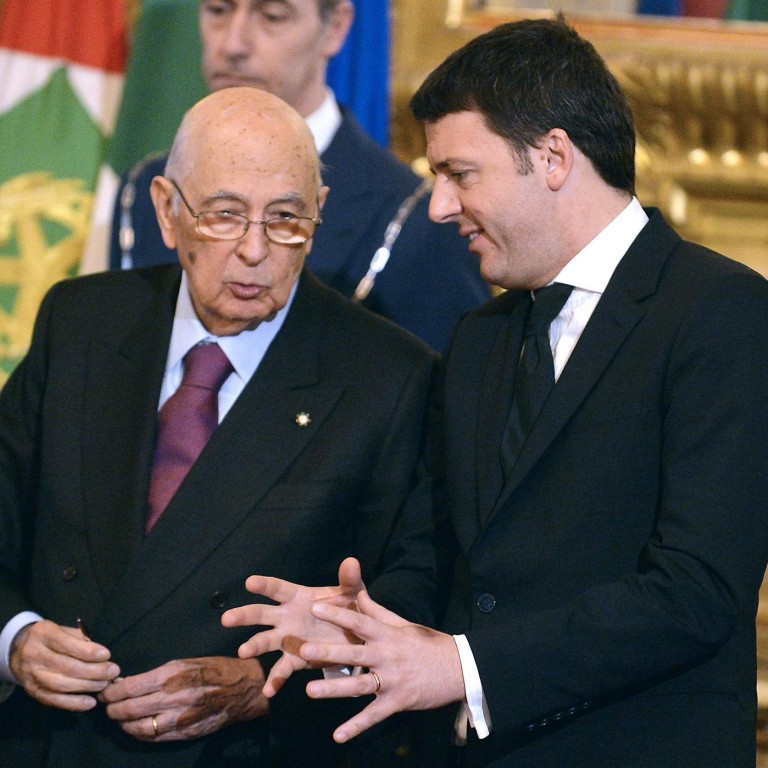
Matteo Renzi, Italy's new prime minister, vows immediate reforms
Italy's youngest PM promises to stay the courseand acts quickly to appoint cabinet of low-profile ministers and formulate economic plans
Italian centre-left leader Matteo Renzi promised to start work on reforms immediately as his fresh-faced cabinet was sworn in yesterday, amid widespread scepticism that the new government has the political maturity to tackle the country's formidable challenges.
The new premier is expected to present his programme to the upper house of parliament tomorrow, before addressing the lower house on Tuesday. In his 16-strong cabinet, half of the new ministers are women and - with an average age of 47.8 years - it is the youngest government in Italy's history.
Renzi confirmed that OECD chief economist Pier Carlo Padoan, who was forced to hurry back from Australia, would take over at the economic ministry, where he will play a central role in Renzi's bid to revitalise Italy's stagnant economy.
Padoan, 63, did not attend the swearing-in ceremony as he was only expected back in Rome later from Sydney where he had joined a G20 meeting of the world's major economies.
With a cabinet boasting no star names, the success or failure of the government will be down to the ambitious Renzi, who forced out party rival Enrico Letta last week.
"We're aiming to get started on things that need to be done from tomorrow morning," he told reporters after a 21/2 hour meeting with President Giorgio Napolitano on Friday.
But he will have to govern with the same cross-party alliance that hampered his predecessor's efforts. Six of his ministers were part of Letta's cabinet, three of them from the small centre-right New Centre-Right party on which his parliamentary majority depends, suggesting that he may have to tread cautiously at times to keep his coalition together.
Renzi, whose main experience in government has been as mayor of Florence, has sketched out ambitious plans for the euro zone's third-largest economy and said he aimed to stay in office until the end of the parliamentary term in four years' time.
Although he has provided few details, he has promised to tackle electoral and constitutional reform, make the labour market and tax systems more efficient and overhaul the public administration, all within four months.
With a fractious parliament and many ministers having to learn how to handle a complex administration as they go, the challenge is considerable.
"There's a need to move quickly on reforms but people forget that to get reforms done in Italy requires very specific skills and there's no guarantee that a good economist makes a good economy minister," said Alberto Mingardi, director general of the free-market think tank Istituto Bruno Leoni.
The country is only just showing signs of emerging from its longest slump since the second world war, fighting to hold on to a crumbling industrial base and provide jobs for millions of unemployed, many of them young.
Renzi's room for manoeuvre will be constrained by the need to control Italy's €2 trillion (HK$21 trillion) public debt, with the euro zone still scarred by memories of the crisis in 2011 which nearly broke the single currency apart.
Padoan, a respected former International Monetary Fund official, will be the fourth technocrat in a row at the economy ministry, the key contact point with the European Central Bank and European Union partners.
As head of the Organisation for Economic Co-operation and Development's economics department, Padoan has called for aggressive easing from the European Central Bank and was an early critic of tough budget cuts in weak euro-zone economies as they struggled with huge debts.
In other notable cabinet changes, New Centre-Right leader Angelino Alfano remains interior minister, but not deputy prime minister after Renzi ruled out giving him a post that could challenge his authority.
Foreign Minister Emma Bonino leaves the government to be replaced by Federica Mogherini, a 40-year-old defence and foreign policy specialist.
Milan, Italy's fashion capital, wants action from new government
Milan and Rome are Italy's yin and yang: fashion capital, political capital, their fates entwined.
This past week, while Milan revelled in what it does best, showing off its Made in Italy ready-to-wear fashion to the world, Rome has been mesmerised by the rapid rise of Florence mayor Matteo Renzi to prime minister. Though one capital is viewed as productive and the other as entrenched, Italy's fashion world is mindful that whatever is decided in Rome is crucial to the industry's competitiveness.

Milan celebrated under the shadow of turmoil in emerging markets, where strong export sales have helped shield luxury designers from stagnation at home. Another worry is a report from consultancy Bain & Co that found the stellar growth enjoyed by the global luxury sector is beginning to slow.

